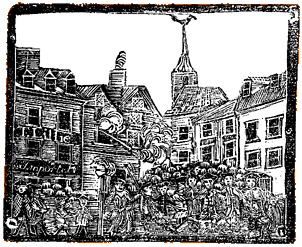Ebenezer Richardson: Customs informer and killer
 In April 2005, Hiller B. Zobel, author of The Boston Massacre, gave a lecture at the Old South Meeting-House on the killing of Christopher Seider, eleven days before the Massacre, and the trial of Ebenezer Richardson for that act. Thanks to our local public television station, you can listen to that lecture. (I'm now hearing the part at the end when Judge Zobel answers inaudible questions from the audience; it probably wasn't so mysterious or funny at the time.)
In April 2005, Hiller B. Zobel, author of The Boston Massacre, gave a lecture at the Old South Meeting-House on the killing of Christopher Seider, eleven days before the Massacre, and the trial of Ebenezer Richardson for that act. Thanks to our local public television station, you can listen to that lecture. (I'm now hearing the part at the end when Judge Zobel answers inaudible questions from the audience; it probably wasn't so mysterious or funny at the time.)
Near the start of his lecture, Judge Zobel had kind words to say about my article on Richardson, published in the winter 2005 issue of New England Ancestors. That study was titled "'A Wretch of Wretches Prov’d with Child': From Local Scandal to Revolutionary Outrage," and you can read the complete text online. I missed the event at Old South because I found the wrong date on a webpage, which once again reminds us that you can't believe everything you read on the web (except maybe here on Boston 1775).
In a nutshell, Ebenezer Richardson of Woburn (born in 1718) married a local widow with children and a comfortable estate, then got her sister pregnant, kept quiet while a local minister was blamed for the illegitimate child, waited until his first wife died, billed her estate for the care of her kids, and went to Boston with the sister to get married. In the middle of those events he was put in jail and escaped; I don't know how or why. It's not surprising that Richardson became unpopular in Woburn.
Moving to Boston, Richardson worked as a confidential informer for the Attorney General and then for Customs officials, getting caught up in the intraoffice politics discussed at the start of Smugglers and Patriots, by John W. Tyler of the Colonial Society of Massachusetts. With his cover blown in the mid-1760s, Richardson became an official Customs employee, enforcing the laws against smuggling and helping to collect the new Townshend duties. Because of this work, Richardson became very unpopular in Boston.
In 1770, Richardson tried to break up a picket line of boys outside a shop in his North End neighborhood. The boys turned their hostilities on his house, so he shot a musket out his window, wounding a teenager named Samuel Gore and killing a younger boy named Christopher Seider. Richardson became immensely unpopular in Massachusetts.
Richardson was tried and convicted of murder, but the royally appointed judges delayed sentencing him because they felt he should and would receive a pardon from London. Indeed, the pardon arrived years later and the judges let him go, as Judge Zobel's talk and the article describe. Richardson quickly traveled to Philadelphia, where the Customs service tried to employ him. But by now Richardson was extremely unpopular up and down the North American coast.
My article describes some documents I found in Britain's National Archives which reveal what Richardson did next, bringing his story up to January 1775.

4 comments:
Is there an updated link to your article about Richardson?
As of this date, the article is no longer online from the New England Historic Genealogical Society.
I would love to read this. I'm writing a piece on the murder of Christopher Snider. Is this article available anywhere? I cannot seem to find it online.
You might ask the New England Historic Genealogical Society if old issues of New England Ancestors/American Ancestors are available in print or digital form.
Post a Comment